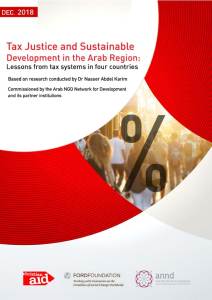Tax Justice and Sustainable Development in the Arab Region: Lessons from tax systems in four countries
The Challenge
“Life, freedom, social justice,” was the slogan of popular uprisings that swept the Arab region starting in late 2010. It reflected the widespread desire for greater political and cultural freedoms and an urgent need to address social and economic issues— including high and increasing rates of wealth inequality and unemployment, a lack of social protection systems, and inadequate public services. Proponents for tax justice argue that tax and fiscal policies play a key role in promoting social and economic justice. But across the Arab region, tax systems are contributing to inequalities rather than reducing them, and there is little transparency or public oversight in tax and fiscal policy making. Loan conditions imposed by international financial institutions have hampered progressive policy development and governments have been reducing spending on critical public services like health and education.
What’s in the Report
Written by Dr. Nasser Abdel Karim, an advisor to UNDP and the World Bank, and supported in part by the Ford Foundation, this 2018 report examines how tax and fiscal systems in the Arab region could better promote social and economic justice. It highlights how tax systems are reinforcing gender and wealth inequality while driving informal employment and high levels of migration in Arab contexts.
“Fair taxation is at the heart of social justice in the Arab region.”
Dr. Nasser Abdel Karim
Looking specifically at Egypt, Lebanon, Jordan and Palestine, the report compares features of the tax systems in these countries and identifies shared challenges across them. In all four countries, tax revenues are less than their tax potential, and fall short of government spending, worsening national debt problems. The cost of servicing these debts eats away at public revenues that could go to essential public services. Both direct and indirect tax rates disproportionately burden poor and low-income people, while the rich benefit from minimal taxes on wealth. All four countries suffer from tax evasion and avoidance.
Based on the challenges, the report suggests reforms that are applicable to these or similar contexts, namely:
- Tax and fiscal systems should support sustainable and equitable national development. They should be aligned to national development plans and ensure the efficient use of resources, for example, through public investments that bring sustainable economic benefits and reduced spending on arms and security; budgeting for economic and social policies that respond to the different needs of men and women; and increasing financial resources for social protection and public services that meet the needs for people living in poverty.
- Tax policies should be effective and fair. The tax burden should be distributed equitably and proportional to people’s ability to pay, increasing the tax burden on wealthier individuals and large companies rather than on lower income individuals. Tax collection should be efficient to maximize the available resources for sustainable development. Reforms should promote fairness by improving differentiation in tax rates, and redesigning tax incentives, for example, to support investments in job-creating economic activities and small enterprises. Taxes on goods and services should distinguish between luxury and essential goods.
- Tax systems should be transparent and accountable. Governments have a duty to respond to the needs of their citizens, ensuring that policies are coherent with national sustainable development commitments and human rights. They should put in place measures to combat corruption and tax dodging, and create mechanisms to expand community and civil society participation in tax and budget processes at all levels.
